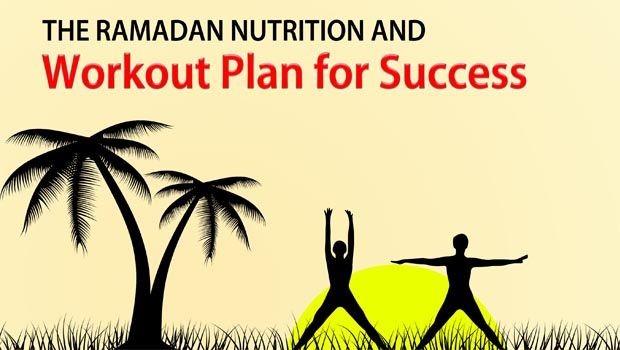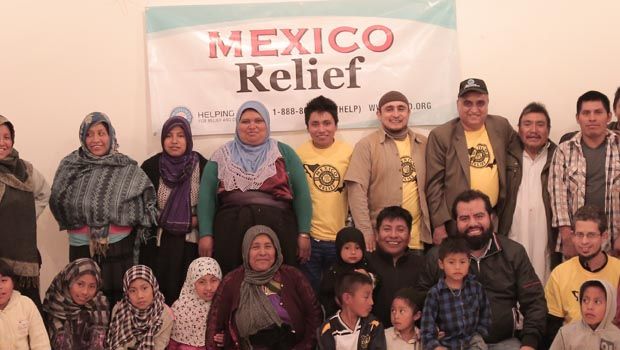I am frequently asked, “How can I workout and eat properly while fasting?” Some people think that during Ramadan they will be unable to continue working out and worry that the gains they’ve made in getting and/or staying fit will be lost. Others think they can only “maintain” themselves during this month, while many Muslims actually gain weight! If you use some of the strategies I am about to share with you, you can make some of your best gains during Ramadan. It’s all about maximizing nutrient uptake, maintaining proper hydration, and modifying key fat-burning and muscle-building hormones in your favor. And of course preparation — if you fail to plan, then you plan to fail! A good way to motivate yourself to plan and prepare well is to consider the reality that you can’t truly maximize the spiritual benefit during the month of fasting if your body is sick and tired and your mind isn’t sharp.
First of all, let’s look at what happens to your body during Ramadan. Your main metabolic fuel source for bodily function during fasting is mainly fat, which is a good thing. So the goals during Ramadan are 1) to maximize metabolism (even though your metabolism will slow down due to less frequent meals); 2) to preserve and enhance as much lean muscle mass as possible (which will inherently increase metabolic rate and allow you to burn more calories at rest); and 3) to maximize your workout (both cardio and weight training). During Ramadan, depending on your goals, I really recommend that you limit cardio to two days a week at the most. This is, again, to preserve as much lean muscle tissue as possible.
There is ample research showing the health benefits of fasting. It is truly a physical purification. In a study published in the reputable European Journal of Clinical Nutrition, the researchers concluded “no detrimental effects on health have as yet been directly attributed to negative water balance at the levels that may be produced in Ramadan.” Other research has actually shown cardiovascular benefits of fasting during Ramadan — that is, if you avoid the IBS. No, that’s not irritable bowel syndrome. It’s the dreaded Iftar Binging Syndrome! It is vital to eat moderate to small meals during and after iftar.
Training Times
The best time to do a weight-training workout is not while fasting. This can create way too much muscle breakdown and cause a significant rise in the catabolic hormone cortisol. Training while in a state of dehydration can decrease strength significantly. In fact, research indicates that dehydrating a muscle by as little as 3 percent can cause a 12 percent loss in strength. Training while you are fasting can actually be more detrimental than beneficial! The best time to weight train during Ramadan is after taraweeh prayers at night. This will ensure that you will have several meals and plenty of water in your system before going to the gym. This will also allow you to consume your all-important post workout meal or shake which is essential to muscle growth which leads to fat loss. If this workout time is too late for you, then the next best time to weight train is about one hour after iftar, before taraweeh prayer. You could do a short but intense 30 minute workout.
The best time to do cardio work for maximum fat loss is before suhoor. Most people I know, however, will not want to get up at around 3:30 a.m. to do cardio! If you can pull this off, then the best thing to do is get up and drink plenty of water and a cup of coffee, green tea, or oolong tea, wait 30 minutes and then perform 30-45 minutes of moderate intensity cardio work like a brisk walk on a treadmill. If this is out of the question for you, then the next best time to do cardio is approximately 30-45 minutes after a “light” iftar. Short, high intensity cardio like sprinting is actually great to do during Ramadan. It takes less than 10 minutes and provides maximum benefit in terms of fat burning and lean muscle preservation. An example would be sprinting for 20-30 seconds at full speed and then walking for one minute. Doing 4-5 cycles like that is good. Start slow, of course, and work your way up.
So now you know when to train; it’s just as important to know what to eat and drink.
Suhoor (The Pre-Dawn Meal)
For suhoor, it is imperative to drink plenty of water, eat a good blend of protein, carbohydrates, and essential fat. “Good fats” have many fat-burning and muscle-building properties, and their importance is even greater during Ramadan. Some good suhoor foods include:
- egg whites (1 yolk is fine)
- chicken breast
- oatmeal
- cream of wheat
- protein shake
- cinnamon
- bananas
- raw, dark honey
- raisins or dates
- fibrous vegetables (this helps increase the feeling of fullness)
- all natural peanut butter
- flax seed oil (a great and tasty brand is Omega Swirl from Barleans; there’s also a version specifically for women – www.barleans.com)
- olive oil (preferably extra virgin which means it’s cold processed and the essential fatty acids are preserved)
- plenty of water
It is important to take a multi-vitamin, multi-mineral supplement with suhoor to make sure daily minimum requirements of key nutrients are met. It is also very important to watch your sodium intake at this time as high sodium can cause greater dehydration plus increase thirst during the day – not good for fasters. Avoid high sodium foods like prepared soups, sauces, condiments, and gravies (home-made is fine as the amount of salt added can be minimal to moderate), high sodium bread products, and canned meats. Of course eating fried foods and heavy oil items can cause heartburn and problems for you all day so it is best to avoid those if possible.
Iftar (Sunset Meal)
The wisdom in Islam is never-ending. We break our fast with dates and water — iftar is a key time for rehydration and dates are very unique in their nutrient content. They contain very high levels of potassium (much more than a banana), a key re-hydration mineral and a special carbohydrate blend that enhances hydration above and beyond water alone. Dates also contain a special blend of glucose and fructose for short and long term energy. They also have a special nutrient called beta D-glucan that is a soluble fiber that can enhance satiety and digestive health. So basically when you eat a date and drink water at iftar, your body gets hydrated again much faster than with water alone. Clinical research published in the International Journal of Food Science and Nutrition, entitled “The fruit of the date palm: its possible use as the best food for the future” concluded that “dates may be considered as an almost ideal food, providing a wide range of essential nutrients and potential health benefits.”
It’s very important to include foods from all five food groups to consume a well-balanced diet rich in fruits, vegetables, beans, lentils, rice, and grains. Prophet Muhammad (peace be upon him) ate a core diet of milk, dates, lamb/mutton, and oats. And the Qur’an mentions the healthful bounty of fruits such as dates, grapes, bananas, figs, and pomegranates; and vegetables such as olives, cucumbers, garlic, and onions. Complex carbohydrates such as whole grains and seeds like barley, wheat, oats, millet, beans, and rice release energy slowly during the long hours of fasting. Food items rich in fiber also digest slowly and these include whole grains and seeds, potatoes with skin, vegetables, and fruits.
Finally, there is so much wisdom in “eat and drink but not to excess” and we should try to follow that especially during Ramadan.
Five Healthy Foods to Eat During Ramadan
- dates – they contain a unique blend of glucose and fructose and have a very high potassium content (about 64 percent more than bananas). They have a nutrient called beta-D-glucan which is a soluble fiber that has health benefits and can increase the feeling of fullness.
- raw, unfiltered honey – it contains many phytochemicals and flavonoids that can enhance health. Honey is very good for increasing energy. It is an excellent source of antioxidants. In fact, ORAC tests show it has the highest level of antioxidants of virtually any natural food on earth. It even has anti-bacterial effects. Take 1-2 tablespoons daily.
- fish – eating fish regularly can have positive effects on health. The fish oils EPA and DHA have been shown to improve brain function, enhance cardiovascular health, and reduce inflammation among other things. Some of the best fish are cold water wild salmon, orange roughy, deep sea cod, sea bass, ahi tuna, mahi mahi, and tilapia.
- figs – they contain key minerals such as calcium, iron, magnesium, and potassium. They are also a great source of fiber and can support healthy blood sugar levels. Figs are an alkaline food which means they help balance the pH of the body making it less acidic.
- olive oil – it contains omega-9 fatty acids (oleic acid). It has been shown to increase the good cholesterol (HDL) while lowering bad cholesterol (LDL). It also seems to have some antioxidant effects. Look for extra virgin olive oil (cold-pressed). Cooking with it can lower some of its benefits. Add it to food after it is cooked!
Have a happy, healthy Ramadan!
Editor’s Note: The content of this article is for information purposes only. Please consult a physician before starting any nutrition, training, or supplementation program.





